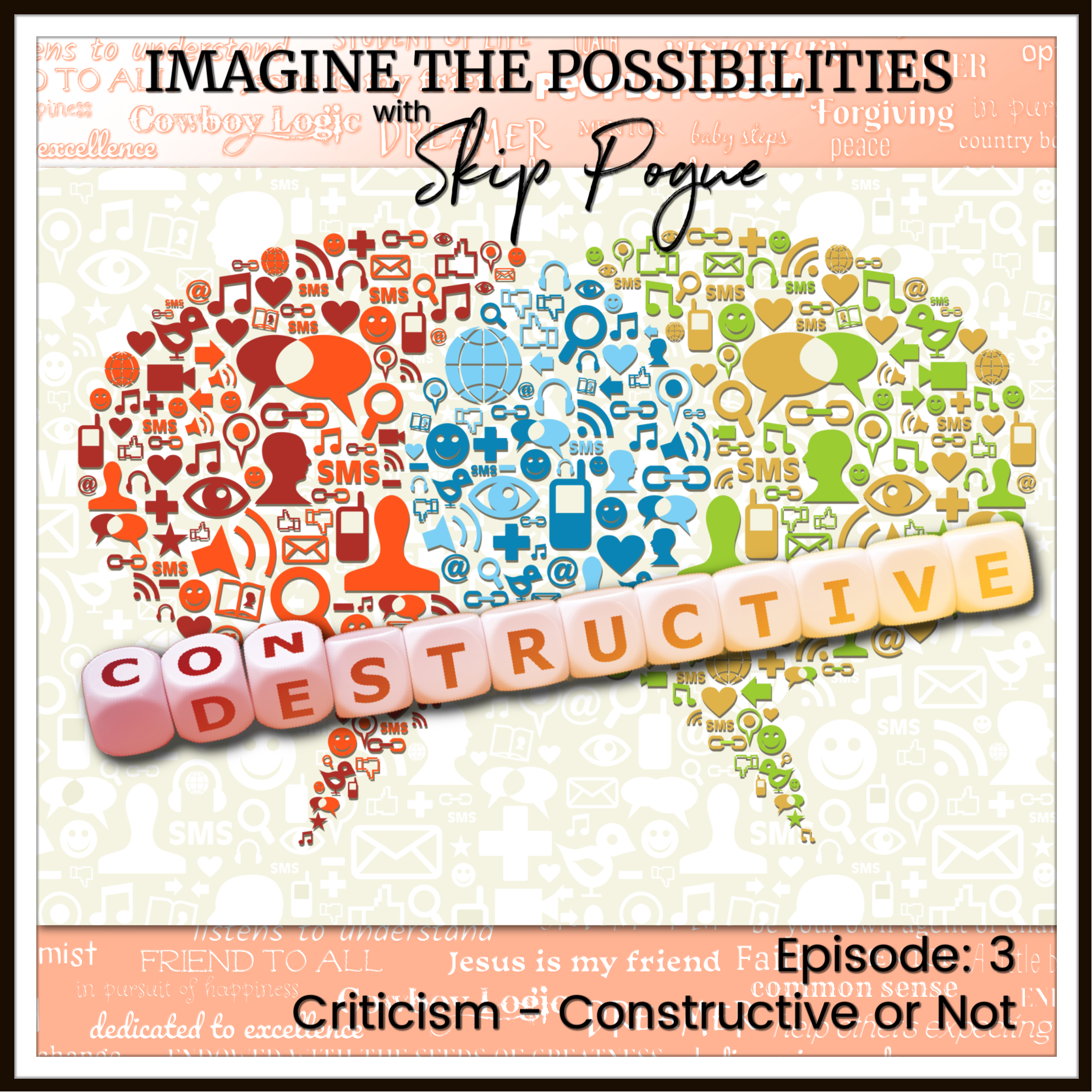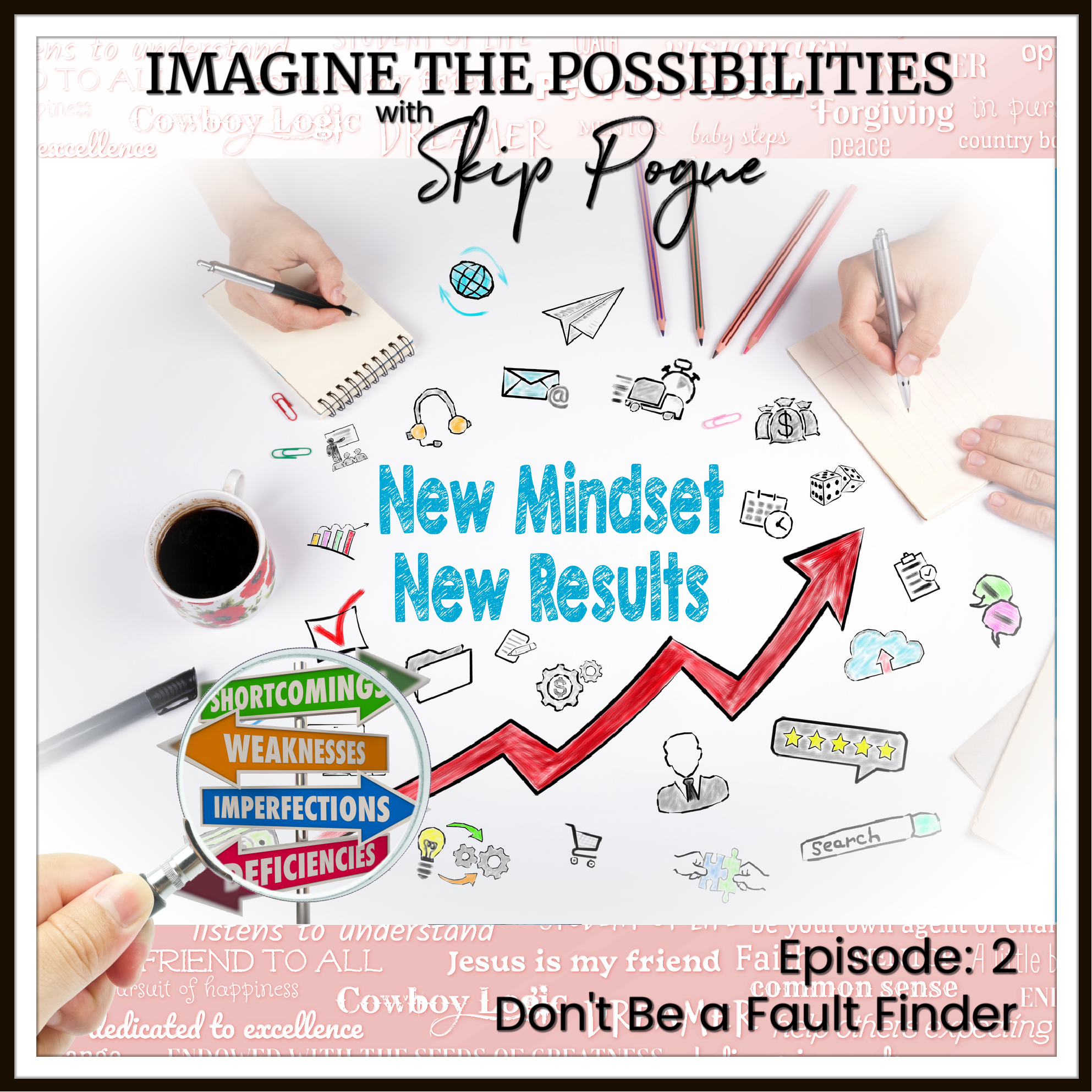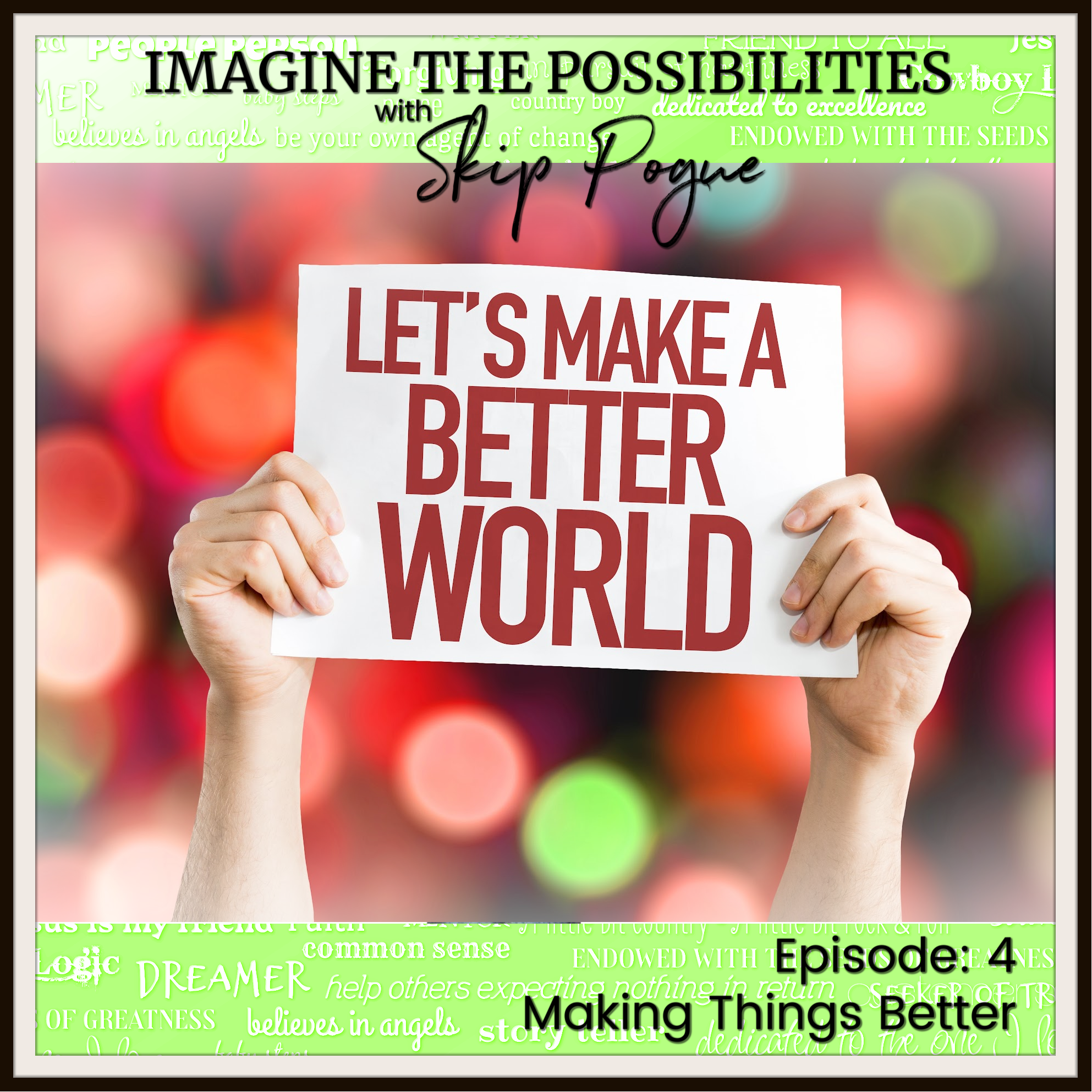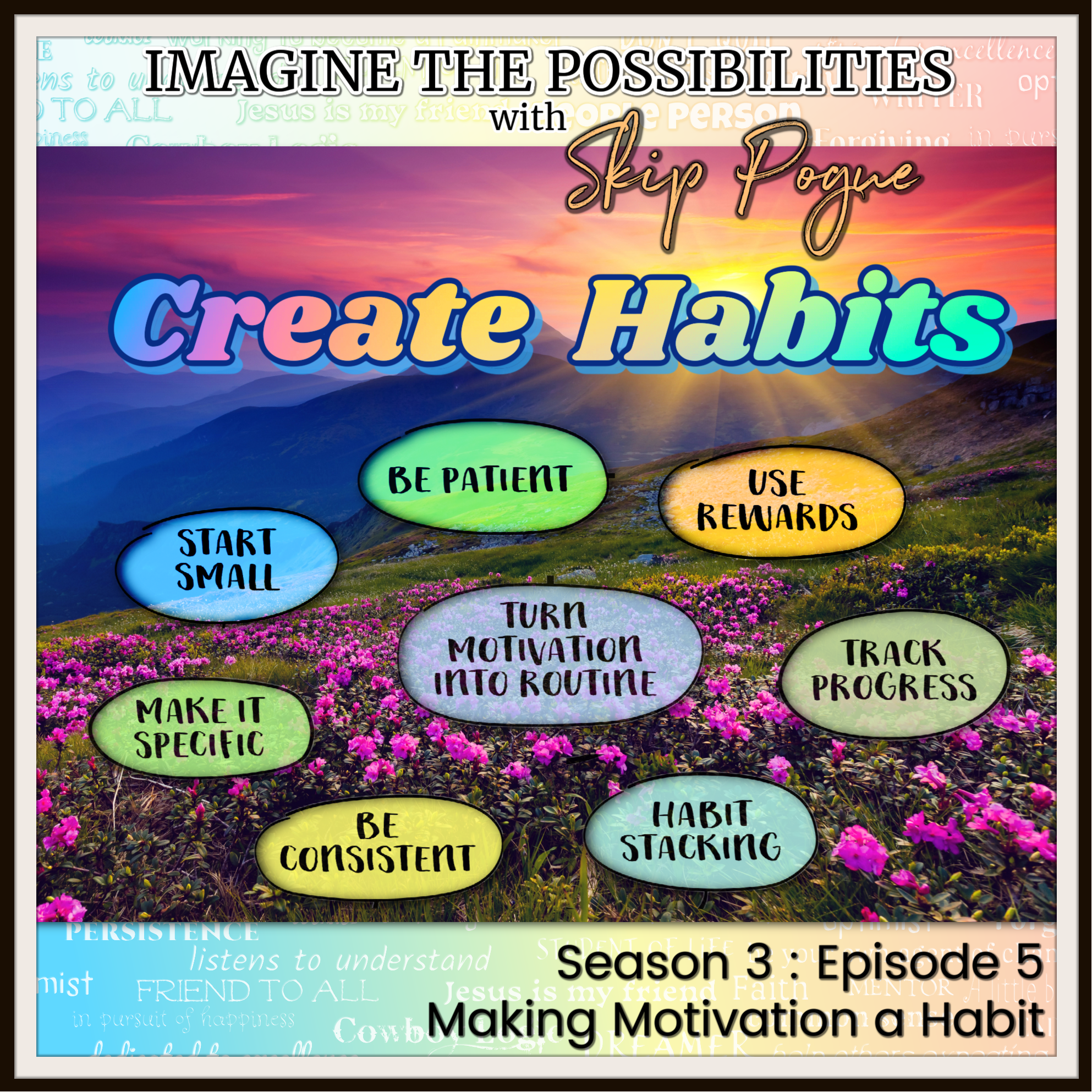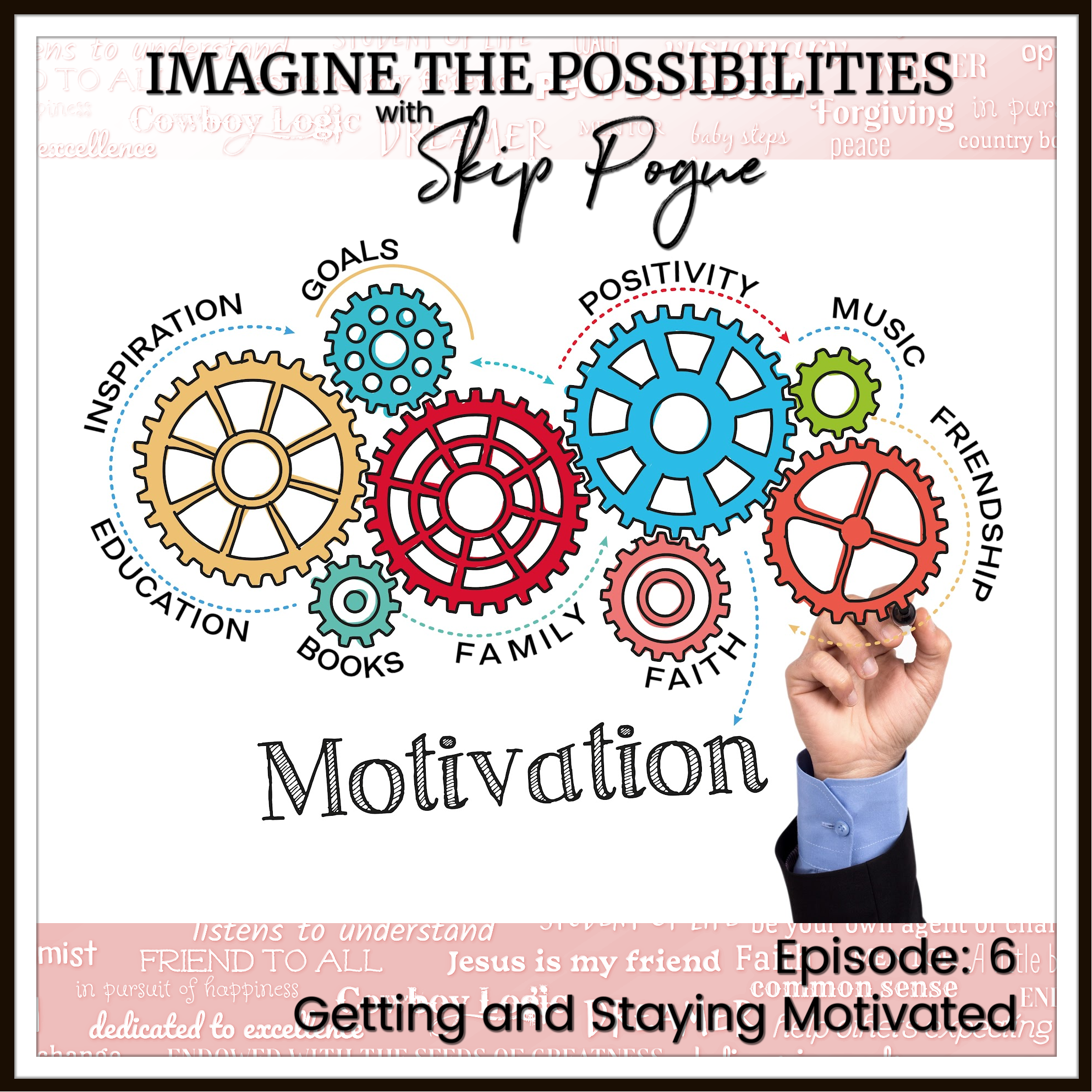Today, we're discussing a topic close to many of us: navigating the internet and handling criticism. With our digital presence spanning Facebook, Instagram, LinkedIn, and more, we open ourselves to both constructive criticism and plain negativity. Constructive criticism, when given with kindness, can help us improve and grow. However, online trolls aim to undermine our confidence and achievements.
View Full Transcript
Episode Transcript
[00:00:04] Hello and welcome to imagine the possibilities. My name is Skip Pogue. Before we get started on today's subject, I'd like to take just a minute and explain something that I discovered about the first two podcasts. I went back and listened to both of them, and I discovered they seem to be very business focused. And that's not the intent of this podcast. The intent is to look at our lives as multifaceted. That's our spiritual life, our personal life, and our professional life.
[00:00:39] And the first two didn't do a good job at that. So moving forward, I'm going to try to maintain that focus a little bit better.
[00:00:47] So anyway, hopefully that'll help and everything. And I'm going to tip. Today I want to talk about something that is near and dear to most of our hearts, and that's being on the Internet.
[00:01:02] When we take the time and get on the Internet, we wind up exposing ourselves. And when it comes to being on the Internet, I'm on Facebook, Instagram, Substack, Pinterest, Tumblr, LinkedIn, Twitch, Discord, and probably another three or four other sites.
[00:01:30] And then I'm on. I'm a podcaster now. I'm doing podcasts. So when we're on all those type of sites, we open ourselves up for constructive criticism and criticism.
[00:01:48] Now, when I talk about constructive criticism, I'm talking about somebody that takes the time. And because of kindness and a willingness to want to help you, they provide you with positive feedback. You say, how can criticism be positive? Well, it can be because what they're trying to tell you is something that they saw that you did, and they want to help you improve it. Not saying they want to criticize you directly, but they want to give you a way or means if you agree that it's an issue to improve it. And that's the first thing you have to do, is when you receive constructive criticism, you need to evaluate it and realize that, hey, they're right, I do that, or hey, they're not right. But maybe there's something nugget in that that will help you improve your product, be it a podcast or artwork or whatever it is you're doing. The second type is criticism.
[00:02:53] Now, when you look at criticism and you receive it on any one of those numerous sites, we all get on every day, probably somebody, and, and there's more than one somebody out there, and I'm sure I've run into it, so I'm pretty sure everybody else has, too. There are people on the Internet who live to criticize other people. Now there's probably a dozen or more psychological reasons they do that, but the biggest one in my mind is they just want to mess with our heads. They want to get in our head and convince us that we're not capable of doing something we believe we are.
[00:03:33] For instance, if you go take up oil painting or photography, or learn to ride a dirt bike or hiking, or whatever it is, this individual will tell you you can't do that. You're not smart enough, you're not.
[00:03:50] Whatever the reason is, they'll give you a reason you can't do it. And they will continue to articulate that reason as long as you listen to them. And if you allow them to get in your head, they may convince you, hey, you go and you're like, I can't do oil painting. I've never done oil painting. I don't care. I can't take a class, and I'm not going to be good at it. Or if it's photography. I just spent $1,000 on new camera equipment and I've got the best equipment I could buy.
[00:04:24] But they're right. I don't know how to take a picture. I don't know how to frame a picture. I don't know about depth of field and all those things. So they convince you that you're going to fail and you internalize that. You take it to heart and you believe this total stranger that you don't know who they are, and they don't know who you are, really. They might have read your Facebook about the about section in your Facebook, but they don't know you. They don't know what you're capable of. Here's something I do know about you. You are capable of accomplishing remarkable things.
[00:05:03] The only things that, the only two things that really requires to accomplish remarkable things is the knowledge. And if you don't have the knowledge, is the willingness to go get that knowledge somewhere and the persistence to keep trying until you're successful.
[00:05:21] If you do those two things, you will accomplish remarkable things. And I know you have it in you to do that, so why listen to this total stranger and let them affect us? But we do it. I've done it. I'm exposed now with this podcast because I ask everybody that listens to it to go over to the sister site for the podcast, which is imagine the possibilities life, and leave me a comment. Now I do ask that you be respectful and kind, at least a little kindness, please, and tell me if I'm doing something wrong or if I can improve some part of it, because that's what it's all about. And constructive criticism allows us to do that. We can evaluate it, look at it, figure out, oh, yeah, I can do that. Or maybe if I bought this piece of equipment, or maybe if I did this, or maybe if I change the way I'm addressing the microphone or a thousand other things. I was amazed when I first started doing the podcast and recording how many different things you have to think about. So, anyway, if somebody's just criticizing you and you realize it's just a criticism and it's meant to get in your head space, delete it.
[00:06:41] First ten words. If you read it and you realize there's nothing constructive about this, it's only meant to be hurtful, harmful, or aggravating. Delete it. Don't read it. Don't internalize it. Don't believe it, because you know better.
[00:06:56] You're better than they are, and you know that. So don't let them get in your head.
[00:07:06] And one way to do that is to think about positive things. And I talk about, and you'll probably hear me talk about later on, but a lot of times about what's called an elevator speech, it's a 20 to 32nd speech. That if you're, if you're in the business world and you got on elevator with the president of the company and he asked you how you're doing, you don't want to tell him about the weather or you don't want to complain, but you need a 20 to 32nd speech that you've rehearsed in your mind, that you can tell him that will make him feel that you have a concern for the company's success. Same thing goes on. If you, if you're going to a church and the minister gets on the elevator with you or walks into the chapel with you and ask you how things going, tell him. Tell him how much he's helping, how many people he's addressing, and things that make a difference in your life, and that's what you need to do. These people that are just sitting around trying to just aggravate and get in your head, don't read it. Don't continue to listen to them. Don't let them do what they want to accomplish. And that's mess you up where you truly believe that what they're telling you is the truth, and you know it's not. So, you know, in thinking about that whole thing, we've got to find ways to insulate ourselves from it, too. And being on half a dozen or a dozen different websites every day we're all going to get it. But I got to the point that if I see constructive criticism and I truly believe it's constructive, I keep it. I look through it. And if it's something I can address, I will try to fix the problem. If it's something I really can't do anything about, I'll put it where it belongs. And that's not in the garbage, but in a file to think about later.
[00:09:16] But I won't let it mess with my head and I won't let it change the person I am.
[00:09:23] But think about how many times, let's say in the last 30 days, if you've been on the Internet in some form or fashion every day for 30 days, think about the people that have criticized you in some way that don't know you, don't care about you. And only reason they did it was to get a rise out of you. And how many times have we responded to those people, you know, and sometimes we respond with the same tone that they started the whole conversation with us about, you know, we're going to aggravate them. And I've seen it. I've done it. I used to be probably bad about doing it, but I've learned better now.
[00:10:15] But think about how many times you or you've seen somebody even in just a discussion group.
[00:10:22] I follow, I like heartland and I follow a couple of sites on Facebook. And I've seen people truly take each other to task, like this is a life or death situation over that. And it all started with the person that wanted to aggravate and somebody in that chain responded to that person's aggravation. And once they did, they were off and running because then they can say whatever they want. Well, you don't know what you're talking about. Yada, yada, yada. And it goes on and on forever. So when you get that type of thing, don't read the whole thing. If you see it's not constructive, delete it. And for goodness sakes, don't let them get in your head. Don't get it in your head. Even after you delete it, don't go back and think about it and say, well, maybe they're right. Maybe I can't do that.
[00:11:17] You want to sing? I can't sing. I guarantee you I can't sing. And everybody in my family will tell you that's true. But you know what I do, Singh? I sing to myself. I sing out loud to myself. How's that? I'm sort of told to go into another room.
[00:11:34] Not really that way, but I know to do that because I sing loud and I sing off key, really bad off key, but I still enjoy it. So whatever it is, don't let people tell you you can't do it. Now if I really wanted to sing, I could probably take voice lessons and learn some things and probably get a bit better at it. But I'm perfectly happy with the way I sing now. But what I'm saying is whatever it is, if it is oil painting or photography or riding a dirt bike or whatever you want to do, if it involves your job, don't let people even I said the Internet. But don't let people in your workplace get on your nerves and tell you you can't do something. If there's an opportunity available and I that opportunity fits in your plans to move forward in your career, then take the opportunity. You may not be able to do it right that minute, but if the manager or whoever has the opportunity accepts you into that position or whatever, they believe you can do it or they wouldn't let you try. So don't. Don't let people influence you negatively in any way.
[00:12:51] And we've all had. We see it all day long. I mean, drama, you know, we watch dramas. Heartland's a drama. And we see stuff I do that I don't like in Heartland because I think, well, that should not went like that. Why would they do that? But it's all involved in negativity and we've just got to get better about it. Find ways to reinforce the positive.
[00:13:20] Look at things you can do daily.
[00:13:23] I have a lot of different things that I listen to and do from the time I get up to the time I go to bed that involve positivity. And those help me. And I even have a recording on the Amazon devices. We use that. If I'm having a tough time getting through something, I'll just tell that device to pet me up and they'll play this positivity stuff for me and I can recite the stuff back. I also have five daily things that I want to accomplish, and I work hard to accomplish each of them. And they're not complex. They're little things like bring a smile to somebody's face.
[00:14:09] But I try to accomplish all five of them every day, and most days I'm successful. So just think about how you can get better and get away from this negativity, especially when it comes to criticism.
[00:14:24] We don't need it. It doesn't do us any good if there's no constructive part of it, it doesn't help at all. It only harms us. So find ways to insulate yourself from it, for goodness sakes, don't internalize it, don't dwell on it. Don't let it mess with your head and your heart.
[00:14:47] If you want to do something, whatever it is, even if you don't know how to do it, but you really want to learn, then learn.
[00:14:56] You don't have to. You know, it doesn't have to be a complex situation, for good sakes. You know, today, in today's world, we have a really cool thing called the Internet, because we can go to YouTube and several other places and look at how to videos to do probably anything either of us can think of. So that's just something that we need to focus on. So I guess in closing, this part of the podcast, if it's constructive criticism and it's heartfelt and done out of kindness and with respect, then read it. Figure out if it's something you can fix. If you can't fix it, you know, that's okay. File it away and think about it. A month from now, make you a little note. I use my phone color notes, and I've got them color coded, and I have things that I filed away that somebody said or told me I ought to try to do. And I'll bring those up about once a month and read through them. And sometimes I fix something, not realizing that I had. And I'll check that one off or delete that section of the note. So just figure out ways to do that. But if it's just pure unadulterated criticism, just be a duck and let it roll off your back like water off a duck's back. Don't internalize it, don't let it get in your head. Don't believe it, because it's not true about you. You know it and I know it, and that's all the difference that you need. If you accept it and start noodling it around, it's going to affect you negatively. So just trust yourself. Trust your head and your heart.
[00:16:48] I truly believe that everybody listens. This podcast is fully capable of accomplishing remarkable things, and I'm gonna leave it at that. So I really, truly appreciate you taking the time to listen to this.
[00:17:09] I appreciate it. In my heart, I thank you for doing that. I know everybody's only got certain amount of time. That's free time for them. And for you to do this really makes me happy and appreciative. So that is something that you need to know. And that's from the bottom of my heart.
[00:17:31] So anyway, if you do have some time, head over to imagineofpossibilities life, the website that's a sister site to this podcast. You'll find transcripts of all the podcasts there. You'll also find some other stuff that I've wrote or I am working on just to make you aware of things. You'll find a section called I want to talk about me and it explains a bit more about my background and my belief system.
[00:18:04] And it also has a list of things I really like, and it has a list of things I really don't like. And both of those are important to me. We need to look at things that we don't like and make sure that we're standing up against those things when they rear their ugly head.
[00:18:28] The other thing that you'll find on there is maybe some things I'm working on and some, I guess, motivational pictures, for lack of a better term.
[00:18:43] They're pictures of sayings that I've come up with or sayings that I like. And most of them are framed in a frame. They're obviously just computer graphics. But you may see something and you print it out. Stick it on your mirror. If you find it a good thing, read it every morning.
[00:19:01] There's stuff like that. So anyway, visit the site, leave me a message about how you think these are podcast are going. If there's a subject you'd like me to talk about, let me know, and I'll try to work it into the schedule. Right now, I'm hoping to do a podcast every two to three weeks. I may wind up doing more, I may wind up staying with that. But right now, based on everything going on, I think that's a valid goal. So. And that's something I'll be talking about. It's goal setting in probably two or three podcasts. I'll get on that subject cause I think that's really important. So anyway, I appreciate your time again, and I truly do believe that we can all accomplish remarkable things. There's no doubt about that. So, moving forward, just remember that your future belongs to you.
[00:19:59] Stay humble, be kind, love deeply, and laugh often.
[00:20:05] I hope you have a super day, and I pray that God blesses each of you in a super way.
[00:20:10] Take care, and thanks again.
